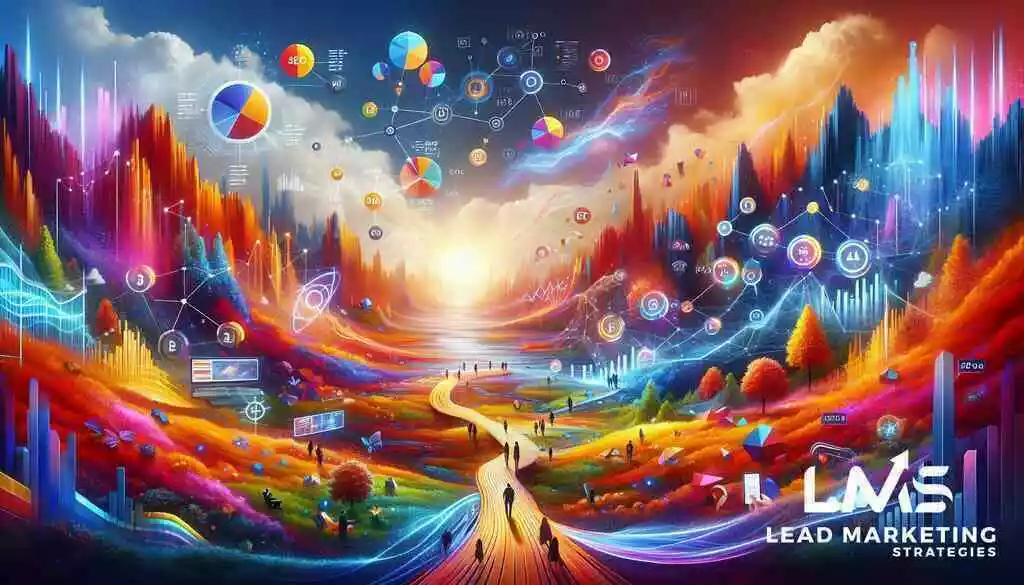
Unveiling the Future of Web Design
A New Era: Advanced Web Design 2024
In 2024, advanced web design continues to evolve at an unprecedented pace. The digital landscape is being reshaped by cutting-edge technologies and innovative design principles that promise to redefine user interactions on the web. As a leading digital marketing agency in New York, Lead Marketing Strategies embraces these changes, positioning itself at the forefront of web design evolution. Incorporating AI-driven design features and enhanced automation tools, web design now creates more immersive and personalized user experiences than ever before.
At the heart of this transformation is Responsive Web Design 2024, which ensures that websites remain adaptable to various devices and screen sizes. This year, designers focus not just on responsiveness but also on speed, accessibility, and security. By implementing progressive web app development and future-proof web technologies, the web landscape of 2024 aims to deliver seamless interactions across platforms while ensuring robust performance and security.
Why Web Design Matters: User Experience Innovation
User experience innovation is crucial as it drives engagement, retention, and conversion rates. A website’s user experience determines how effectively it communicates its message and brands to the audience. At Lead Marketing Strategies, we recognize that user experience design is not just about aesthetics but also involves strategic decisions that impact usability.
With user interface innovation, web design transcends simple navigation and ventures into personalized interactions that cater to individual user preferences. Significant advancements in interface design, enhanced through AI-driven design features, facilitate a closer connection between users and digital platforms. This transformation in the design approach emphasizes personalization and accessibility, which are key to improving user satisfaction and achieving digital marketing goals.
The Blueprint of Tomorrow: Responsive Design Trends
Responsive design continues to be an essential pillar of modern web development, ensuring optimal viewing across all devices. However, 2024 introduces new responsive design trends tailored to the ever-evolving digital ecosystem. These trends prioritize mobile-first design principles, which are steadily reshaping how content is consumed on mobile devices. By embedding more AI and adaptive technologies, websites now provide seamless navigational experiences that dynamically adjust to user interactions and environmental contexts.
In addition to responsive design, sustainability in web design practices has become increasingly important. By adopting sustainable web design elements, businesses aim to reduce their carbon footprint while enhancing site performance. This shift not only aligns with global sustainability efforts but also delivers a faster, more efficient user experience. As the digital realm expands, incorporating progressive strategies and incorporating state-of-the-art features becomes imperative for businesses seeking to stay competitive and innovative in their web presence.
Transformative Design Elements Shaping the Digital Landscape
Embracing the Digital Future: AI-Driven Design Techniques
In 2024, the integration of AI-driven design techniques stands as a transformative catalyst for reshaping the web design landscape. Artificial intelligence not only enhances the development process but also significantly improves user experience by anticipating user needs and preferences. Leveraging AI-driven design features allows designers to automate repetitive tasks, facilitate real-time personalization, and optimize design elements to drive engagement. Lead Marketing Strategies, as a digital marketing agency in New York, incorporates these state-of-the-art practices to ensure our clients’ websites are equipped to meet modern expectations.
AI algorithms analyze user behavior patterns, allowing websites to adapt on-the-fly and offer tailored content and recommendations. This adaptability fosters a seamless user journey that caters to individual preferences, ultimately enhancing engagement and conversion rates. Navigating New York’s Digital Ad Landscape in 2024 Moreover, AI’s integration enables predictive analytics, offering actionable insights for continuous improvement. By embracing these technologies, businesses can gain a competitive edge, ensuring their web presence remains proactive and forward-thinking.
Navigating the Waves: Intuitive Navigation Systems and Mobile-First Design
As digital interfaces evolve, intuitive navigation systems and mobile-first design principles will take center stage in 2024. Recognizing the prevalent use of mobile devices, designers prioritize creating seamless experiences that transcend different platforms. These systems streamline user pathways, enabling effortless navigation that anticipates user intentions, thereby minimizing friction.
A Long Island web design firm like Lead Marketing Strategies understands the significance of implementing mobile-first strategies to enhance usability. By prioritizing core content visibility and user accessibility, mobile-first design ensures that websites perform optimally on any device. This practice not only improves user satisfaction but also boosts search engine rankings. Effective navigation systems use cues, such as visual hierarchies and interactive elements, to guide users logically through the website, ensuring each interaction feels intuitive and cohesive.
Interactive Flourishes: Web Animation Frameworks and Dynamic Content
The incorporation of web animation frameworks and dynamic content transforms static pages into immersive experiences that captivate users. In 2024, these elements will be crucial in delivering engaging and memorable user interactions. Lead Marketing Strategies utilizes web animation trends to create visually compelling stories that enhance brand storytelling while maintaining seamless functionality.
Animations offer a way to draw attention to essential features, guide users through complex processes, and keep them engaged on their journey. Similarly, dynamic content adapts in real time based on user interactions, ensuring relevancy and enhancing the user journey. By using advanced CSS animations and JavaScript frameworks, designers can create sophisticated, smooth transitions that elevate the overall web experience. These interactive flourishes, therefore, not only enrich the aesthetic appeal of websites but also contribute significantly to their usability and effectiveness in capturing audience interest.
Creating a Seamless and Secure Digital World
Safety First: Cybersecurity in Web Design
As digital advancements accelerate, cybersecurity will become a fundamental aspect of web design in 2024. Ensuring user data protection and privacy is paramount in maintaining trust and credibility in online spaces. Cybersecurity strategies are integrated from inception to deployment, embedding security practices directly into the design architecture. By implementing robust encryption protocols and continuous monitoring, vulnerabilities are reduced, safeguarding against potential threats. Businesses must prioritize cybersecurity in web design to foster a secure environment for both their clientele and their brand. Cyber Security Marketing Services Through cybersecurity in web design, Lead Marketing Strategies helps clients by implementing best practices for secure and trustworthy digital engagement, essential for maintaining brand integrity.
With an increase in cyber threats, adopting a security-first mindset is crucial. Incorporating advanced firewalls, secure sockets layer (SSL) certificates, and regular security audits protects digital assets. Furthermore, educating users about safe browsing practices adds a layer of security. As a digital marketing agency in New York known for its cutting-edge solutions, Lead Marketing Strategies integrates sophisticated security measures into its projects to ensure safety and compliance with modern digital standards.
Access for All: Web Accessibility Standards and Inclusive Design
In 2024, creating web platforms that accommodate all users, regardless of ability, is not just an ethical responsibility but a strategic necessity. Inclusive design and accessibility standards eliminate barriers and enable users with diverse needs to engage with digital content. By adhering to the Web Content Accessibility Guidelines (WCAG), designers implement features such as screen-reader compatibility, keyboard navigation, and alternative text for images, ensuring content is universally navigable.
Lead Marketing Strategies champions inclusive web design practices that focus on equal access and benefit for all users. Incorporating accessibility features improves user satisfaction and broadens potential audience reach, positively affecting search engine rankings due to increased traffic and engagement. With accessibility becoming a defining factor in user experience design, businesses that prioritize inclusivity position themselves as forward-thinking leaders in their industry.
Beyond the Surface: Exploring Multimodal Interfaces and 3D Web Design
As technology progresses, multimodal interfaces and 3D web design elements enhance digital interactions by providing rich, immersive experiences. Multimodal interfaces enable seamless communication between users and devices using various inputs such as voice, gesture, and touch, crafting a more natural and engaging user experience. Lead Marketing Strategies explores these innovations to transform conventional browsing into engaging, interactive journeys.
By leveraging 3D web design, companies can present products and services in visually compelling ways, encouraging user interaction and driving engagement. These sophisticated designs use advanced rendering techniques to create realistic and dynamic content that captivates audiences. Real-time data integration further personalizes interactions, adapting content to user behavior and environment for a tailored experience. By embracing these technologies, businesses can stay ahead in a competitive market, presenting cutting-edge interfaces that redefine user expectations.
Innovations that Define Modern Web Experiences
Responsive Narratives: Personalized User Experiences and Adaptive Design
In 2024, responsive narratives will take center stage in cutting-edge web design, focusing on crafting personalized user experiences through adaptive design strategies. Utilizing adaptive design allows web developers to modify content presentation based on user interactions and preferences. This year, technologies that gather real-time user data to personalize dynamic content are integral to creating engaging and memorable online experiences. By leveraging data insights, designers can sculpt narratives that resonate on a personal level, forging deeper connections with audiences.
The concept of responsive narratives challenges traditional one-size-fits-all content strategies, offering instead a tailored browsing journey. These narratives adjust not only text and images but also interactive elements to enhance user engagement, making each visit unique. By integrating adaptive design with AI-driven personalization, the result is an intuitive and satisfying user experience that aligns with users’ changing needs. Such innovation not only enhances user satisfaction but also fosters brand loyalty by delivering relevant and timely content.
Pushing Boundaries: Immersive Web Experiences and Real-Time Data Integration
Web design in 2024 continues to push boundaries, leveraging immersive web experiences that captivate and engage audiences more profoundly. Employing techniques like 3D web design and multimodal interfaces, designers can craft enriched environments that invite exploration and engagement. Immersive web experiences allow users to interact with content in dynamic ways, making digital interactions feel more lifelike and compelling.
Key to these experiences is real-time data integration, which empowers websites to respond instantly to user behavior and environmental changes. Refer to Ultimate Guide to Platform-Specific Branding in 2024. This integration ensures that content remains relevant and engaging, adapting to the context and needs of each user. By utilizing this technology, businesses can offer personalized and interactive journeys that not only captivate users but also enhance data-driven decision-making processes. As these groundbreaking innovations become standard, developing web platforms with intuitive interfaces becomes crucial for brands aiming to differentiate themselves in a competitive marketplace.
Design Evolution: Advanced Prototyping Tools and Design Automation
Advanced prototyping tools and design automation techniques will strongly influence the advancement of web design in 2024. These tools streamline the design process, empowering designers to create and iterate on complex web ideas quickly. Check out the Top 5 LMS Marketing Tactics by Lead Marketing Experts. By utilizing software that supports rapid prototyping, teams can experiment with various design concepts, ensuring optimal adaptability and performance across devices and user contexts.
Design automation, on the other hand, leverages AI to automate repetitive design tasks, allowing for faster project completion and more room for creativity. These automation tools optimize the development workflow, helping designers focus on strategic elements that enhance user experience. As we advance deeper into an era of sophisticated web design, the ability to swiftly adapt to industry trends while maintaining high-quality standards becomes essential. This transformation not only showcases the power and potential of innovations in web design but also sets new benchmarks for efficiency and effectiveness in digital marketing strategies.
Through consistent innovation and the integration of these advanced techniques, Lead Marketing Strategies empowers businesses to stay ahead of the curve, offering unparalleled solutions in effective web design for NY. Our focus on employee creativity and automation ensures that our clients receive the most cutting-edge and impactful designs the industry has to offer.
Architecting the Future Web
The Green Factor: Sustainable Web Design Practices
In 2024, the movement towards sustainable web design practices has gained significant momentum. These practices underscore the importance of eco-friendly digital solutions that minimize environmental impact while maintaining user satisfaction. At Lead Marketing Strategies, we advocate for a sustainable approach by emphasizing energy-efficient design methods and the reduction of data transfer. Minimizing data loads through streamlined coding, optimized images, and efficient hosting solutions decreases the carbon footprint of websites. This commitment to sustainability not only aligns with global environmental initiatives but also enhances site performance, leading to faster loading times and improved user experiences. Real Estate Digital Marketing Services Incorporating sustainable web design elements is key for businesses looking to connect with eco-conscious consumers while maximizing operational efficiency.
Incorporating green technologies integrates well with modern user expectations of speed and efficiency, all while cultivating a brand image that reflects responsibility and foresight. Companies looking to adopt these practices can leverage tools and techniques that monitor environmental impact, allowing them to make informed decisions that align with sustainability goals. These eco-friendly solutions not only contribute positively to the planet but also provide tangible economic benefits through reduced operational costs.
Future-Proofing: Progressive Web Apps Development and Future Technologies
The surge in progressive web apps (PWAs) exemplifies the focus on future-proofing digital strategies for businesses. Lead Marketing Strategies: Dissecting SEO’s Impact in NY These apps bridge the gap between web and mobile applications, offering the best of both worlds through enhanced speed, reliability, and engagement without requiring users to download anything. Lead Marketing Strategies emphasizes progressive web app development as a foundational step in creating resilient and future-ready web platforms. With capabilities such as offline functionality, push notifications, and faster load times, PWAs provide an app-like user experience that enhances engagement and customer loyalty.
The integration of future-proof web technologies is essential for staying competitive in a rapidly evolving digital landscape. Technologies like service workers, web app manifests, and HTTPS are fundamental to PWA development. Businesses that invest in these technologies position themselves to meet modern user demands and capitalize on tech-driven growth opportunities. This strategic focus ensures longevity and adaptability in a world where technological change is constant.
The Road Ahead: Anticipating Trends in Web Design
As we venture into the future, anticipating trends in web design is crucial for maintaining a cutting-edge digital presence. Embracing innovations like immersive web experiences, real-time data integration, and adaptive design sets the stage for engaging user interactions that transcend traditional boundaries. At Lead Marketing Strategies, we continuously track emerging trends to offer our clients forward-thinking solutions and advanced web design services. Upcoming technologies like augmented reality (AR) interfaces, voice search optimization, and AI-driven personalization are central to transforming the user journey.
The digital landscape in 2024 demands a commitment to adaptability and innovation. Businesses should focus on developing flexible platforms that can easily integrate new technologies and trends. By staying ahead of the curve and embracing change proactively, companies can not only meet evolving consumer expectations but also lead the charge in setting new industry standards. Engaging with these advancements allows for crafting genuinely unique user experiences that drive brand loyalty and engagement.
Conclusion: Navigating the Advanced Terrain of Web Design 2024
Reflecting on Innovation: The Impact on Marketing and User Engagement
As we reflect on the pioneering trends that define advanced web design in 2024, it’s clear that innovation plays a pivotal role in transforming digital marketing landscapes. The adoption of AI-driven design techniques and immersive web experiences has redefined how businesses engage with their audiences. By leveraging these cutting-edge elements, companies can craft more personalized and engaging interactions that resonate well with users. This focus on innovation not only enhances user engagement but also amplifies brand loyalty, setting businesses apart in a competitive market.
The strategic integration of future-proof web technologies enables brands to deliver seamless, relevant, and impactful experiences. As web design continues to evolve, marketing strategies must adapt to harness these technologies effectively. The synthesis of responsive design trends and advanced cybersecurity measures ensures that businesses maintain a secure and compelling digital presence. As a digital marketing agency in New York, Lead Marketing Strategies remains at the forefront, guiding businesses in navigating this complex yet rewarding digital terrain.
Adapting to Change: Preparing for the Next Wave of Web Innovations
To stay ahead in the ever-evolving landscape of web design, businesses must embrace adaptability. Preparing for upcoming innovations requires a forward-thinking mindset that anticipates changes and seamlessly integrates emerging trends. Investing in progressive web app development and sustainable web design practices is crucial for businesses aiming to future-proof their digital platforms. These technologies facilitate swift adaptation to market demands while ensuring robust performance and environmental responsibility.
As we look toward the future, it’s essential to adopt adaptive design strategies that anticipate user needs and deliver tailored experiences. Businesses on Long Island, like Lead Marketing Strategies, focus on cultivating long-term success by aligning web design practices with strategic marketing goals. By embracing innovation and flexibility, companies can confidently navigate the next wave of web advancements, ensuring they remain leaders in their industry and continue to delight their audiences with exceptional experiences.
The journey toward mastering advanced web design techniques offers exciting opportunities for growth and engagement. By embracing change and leveraging the insights gained, businesses can achieve measurable success and lead the way in shaping the future of digital marketing. Hire Lead Marketing Strategies as your partner in this dynamic landscape, where your vision becomes reality through expertise and innovation.
Frequently Asked Questions
Question: How do AI-driven design techniques shape web design at Lead Marketing Strategies?
Answer: AI-driven design techniques at Lead Marketing Strategies elevate web design by introducing automation and personalization. These advanced technologies analyze user behavior and preferences to create a tailored browsing experience. By employing AI, our design process becomes more efficient, freeing designers to focus on strategic and creative elements that enhance user engagement and satisfaction. AI-driven design enables us to anticipate user needs, optimize interactive web elements, and drive conversion rates. This approach ensures our clients have a competitive edge in adapting to evolving digital landscapes. Check out Practical Web Design Tips for NY Entrepreneurs.
Question: What sustainable web design practices ddoLead Marketing Strategies implement to reduce environmental impact?
Answer: Lead Marketing Strategies is committed to incorporating sustainable web design practices that align with global environmental initiatives. We focus on minimizing data loads through streamlined coding and optimized images, which enhances site performance and reduces carbon footprints. By utilizing energy-efficient hosting solutions, we ensure that our web design practices significantly lessen environmental impact while maintaining user satisfaction and speed. Adopting sustainable strategies not only meets eco-conscious consumer expectations but also provides economic benefits by reducing operational costs. Look into Guide to LMS’s Revolutionary E-commerce Strategies.
Question: What defines advanced web design techniques in 2024 according to Lead Marketing Strategies?
Answer: According to Lead Marketing Strategies, advanced web design techniques in 2024 are characterized by the integration of AI-driven design, responsive design trends, and immersive web experiences. Our focus is on creating dynamic, adaptive design strategies that ensure personalized user experiences across all platforms. By employing progressive web app development and leveraging future-proof technologies, we provide our clients with robust, efficient, and engaging digital solutions. Our comprehensive approach combines aesthetic appeal with practical functionality, setting new standards in the digital marketing sphere.
Question: How does Lead Marketing Strategies ensure web accessibility and inclusivity in its design projects?
Answer: At Lead Marketing Strategies, we prioritize web accessibility and inclusive design to accommodate all users, regardless of their abilities. See more on Strategic Web Design Principles for Commack Businesses. By adhering to the Web Content Accessibility Guidelines, we implement features such as screen-reader compatibility, keyboard navigation, and alternative text for images. These accessibility standards eliminate barriers, ensuring all users can engage with our clients’ digital content. Our commitment to inclusivity not only broadens audience reach but also enhances user satisfaction and positively impacts search engine rankings by increasing traffic and engagement.
Question: How are intuitive navigation systems integrated into web design to enhance user experience?
Answer: Intuitive navigation systems are a cornerstone of enhancing the user experience in our web design projects at Lead Marketing Strategies. We focus on creating seamless pathways that streamline user journeys, minimizing friction, and making interactions feel natural and cohesive. By employing mobile-first design principles and adaptive web technologies, our websites perform optimally across devices, ensuring core content visibility and user accessibility. Dive into the Top Digital Marketing Tools for Commack Businesses. Well-organized visual hierarchies and interactive web elements guide users efficiently through digital interfaces, significantly improving usability and user satisfaction.











